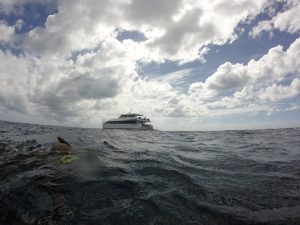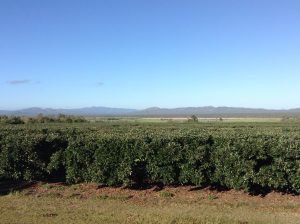This 3.5-week program focused on sustainability in Queensland, Australia. We studied the struggles and successes of ecological, political, social, agricultural, and financial factors affecting Queensland’s Aboriginal population, water resources, wildlife, World Heritage sites, mangrove forests, Great Barrier Reef (GBR), and tourism. We heard stories first hand from Aboriginal elders about the oppression of their people, listened to experts on wildlife, stayed with homestay farm families, and snorkeled with Reef experts.
Australia’s history is of a much darker note than I had previously thought. I learned about horrors of the European colonization and the oppression of the Aboriginal peoples. Upon landing, Terra Nullius was enacted and equated the Aboriginals with wild animals to be eradicated. Decades later, the Stolen generations occurred and brought grief, pain, and confusion to hundreds of aboriginal children and their families; this European attempt at assimilation stole culture, language, and freedom. The Aboriginals today are mostly without land and lack a purpose in their lives, many found in prisons, bars, or on the streets. What is worse, this Australian history is not taught in schools.
This program raised my awareness of water conservation because I could see the issues of drought and water scarcity in Australia. I too often take for granted that I have access to one of the greatest freshwater resources in the world. This will influence my behavior, in that, I will personally conserve water and actively participate in volunteering that aids in river cleanups. As an American, I realized how privileged I am: I have abundant access to water (droughts or water scarcity is not a concern) and I am not isolated from most goods or services (internet, shops, etc). I got to see how some Australians view America, whether it be values, education, politics, or wildlife. In addition to water conservation, Australia’s ocean pollution serious degrades marine life. At Port Douglas, our group was fortunate to aid in a beach clean-up. Out of all the trash, most of it was tiny bits of plastic that will never erode. This made me ponder the needless waste of single-use plastics and how much I use them in my everyday life. After this trip, I am even more conscious of American white privilege, water waste, and plastic use in my life.
Towards the beginning of the trip, we traveled to Mungalla Station, a restored farmland that belongs to decedents of the Nywaigi Aboriginal tribe. Here, we met Jacob and his family and had lunch together. We learned about the horrors of the world circus and how people from his tribe were taken and put on display for Europe and America. The elders told us heartbreaking stories of the stolen generations; this refers to the children (mixed aboriginal and white) that were taken from Aboriginal families in the 1940’s-1960’s in an attempt at assimilation. I witnessed the incredible diligence and passion Jacob’s wife had in fighting for Aboriginal rights, education, healthcare, and more. My spirit broke for the immense pain and heartache that these people have faced; they are fighting the repercussions of an invasion.
At Atherton, the students were divided into groups of 4-5 and each group went to stay on a different farm with a homestay family. I and three other girls were stationed at a 100-acre avocado farm with a younger couple, Cassie and Brenton. Here, we helped with tasks like washing the dogs, picking avocados, and feeding/brushing the horses. For recreation, we hiked and fed rock wallabies, took a bike ride, and had bonfires under the stars. We had lovely dinners and afternoon “teas” where we could discuss water scarcity issues, values in education, and the differences between the States and Australia. Atherton has not experienced a good wet season for a few years. The farmers rely on wet seasons to supply the dams with water for the irrigation channels. So, the water levels and the farming industry is at risk in this dry period. Cassie and Brenton had never heard of the Great Lakes and I realized how fortunate I am to live near some of the greatest freshwater resources in the world. I have a new appreciation for such easy access to drinkable water and am now aware of my wasteful habits (like long showers).
At Port Douglas, we performed a beach clean-up with an organization that records each kind of trash that is found, then tracks the trash back to the source and advocates for change. In the past, they have found the source of packing ties that ended up on the shoreline. Now the company changed the way they pack their equipment. On the beach, our group found some plywood, rubber tubing, cigarettes, and food wrappers. But the most trash we found was tiny bits of plastic. This plastic might break down and get smaller, but it will never ever degrade. They turn into micro plastics that marine life ingests, which then gets into human digestive systems. Developed countries run ramped with their single-use plastics. I look at my own life and realize how much of a waste it is to receive instant gratification, only to contribute to pollution, ecosystem degradation, and health problems around the world. I want to significantly reduce my single plastic use, choosing reusable over single-use and bulk over small packaged grocery items.
This Australian study abroad experience has stretched my comfort zone, increased my confidence in travels, and granted a larger perspective of sustainability. Before this trip, I have never traveled outside of the United States. I’ve always had the desire to travel and branch out of my American worldview. But this proved difficult growing up in a big family and a small town with few opportunities. Ohio State has granted me access to unexplored cultures, languages, and ecosystems around the world. Because of this experience, I am excited to pursue a career that takes me around the globe for ecological restoration. I have seen the difference that one passionate person can have; I believe that, through God’s love, I can truly make an impact for good.
My perspective of the world has been expanded; I know there is much more to the planet than the United States, and that those in other cultures have different views, ways of communicating, and values. Aussies in general, have a laid-back culture and most are very knowledgeable about the world around them. I love how animated some Australians can be in sharing stories. It was enlightening to learn about Australia, the good and the bad, to better understand their choices and way of life. I’m so thankful for a personal, firsthand experience in their culture. I want to continue to educate others on the importance of conservation, climate change, and Aboriginal history. I desire to continue volunteering on sustainable projects around campus and pursue a career in which I can truly make an impact for good on this planet.





Wow, what an experience. I cannot imagine the stories in which you heard about the Aboriginal history and how this impacted and still impacts individuals today. Hopefully, after this trip, you have been able to find ways to continue to learn about white privilege, conservation, and climate change within the states. There are multiple organizations on campus that have values pertaining to all three of those topics.